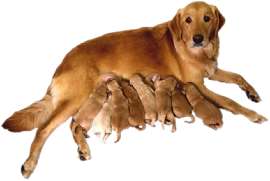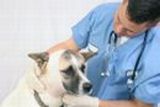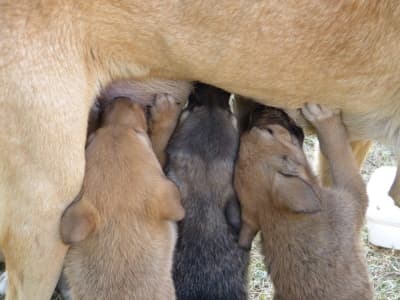Pregnancy In Dogs
What To Know Before You Breed!
While pregnancy in dogs is not rocket science, it can be stressful the first time around if pet parents are not well-prepared.
During the gestation period, which averages around 63 days, it's good to know what to expect, which this article will explain.

If your dog is pregnant, stick around and we'll get you up to speed on the essentials of caring for the "lady-in-waiting". That's assuming of course that you already have a pregnant dog!
On the other hand, perhaps you're here to learn more about pregnancy in dogs before deciding whether to breed your dog. Great!
Even though you love the idea of witnessing the miracle of nature and
hearing the pitter-patter of tiny pooch paws, you also intelligently
realize that now is the time to consider your best friend first. Not to
mention that you'll be up from dawn to dusk if you find yourself with a litter of pups!
Most Important Priorities
Right off the bat,
- Ensure that both dogs to be mated are healthy
- Professionals advise waiting to breed until the second or third heat - depending on breed, around 2 years
- Establish a solid plan for the puppies. Having "guaranteed" loving homes lined up before mating is essential.
- This includes being prepared to raise them yourself if someone backs out. There's no compromising on this point in our view. Once a life is created, it becomes your responsibility for its lifetime.
With so many thousands of dogs left abandoned and often dying in shelters, dog breeding is not to be taken lightly. So become fully informed about the pros and cons, then think long and hard before deciding.
Alternatively, adoption of a shelter dog - even a pregnant dog rescue is a heartfelt choice to consider before you make your breeding decision.
Is Your Dog "Pregnancy" Fit?
Good health is vitally important if you're planning to breed your dog as this will have a strong influence on the success of a pregnancy. Fitness and good health will not only make it easier to care for a pregnant dog, it will also lessen the risk of complications along the way.
To be on the safe side, have your vet do a complete physical to evaluate your dog's health to make sure she is fit enough for a successful breeding. Also, you'll want to find out if your dog has any inheritable conditions that may change your mind about breeding.

Once you have chosen a sire, he should be in as good health as your female dog and have been screened for genetic conditions as well.
Animals don't have a say in the matter when it comes to the home mating process so it's up to us to to be well-informed before taking the important step of bringing our pets together.
Another factor you'll want to look into is whether your dog is likely to
need a cesarean. Some breeding trends have resulted in dogs with
pelvises too small for normal birthing. And if your dog does not have a
normal anatomy, you may not want to breed her at all.
But once you're really sure you want to mate your dog, come back and keep reading.

Pregnancy In Dogs - What To Do After the Mating
First and foremost, after your dog has been mated, make an appointment with your vet for a dog pregnancy test. Your vet will likely do a general health check along with a blood test to look for changes in the hormones related to pregnancy.
He may also perform a dog pregnancy ultrasound if he determines your pet is about three weeks along.
Once the pregnancy is confirmed, make sure your dog is getting the best nutrition and take her for whatever follow-up visits your vet recommends to make sure all is going well.
While the prenatal checks may only be needed two or three times, they are highly recommended - especially if you are new to breeding.
These visits are a good time to get your questions answered and to clarify anything you're not sure about. This will give you added confidence in caring for your pet during the pregnancy.
Signs of Dog Pregnancy - Palpating The Fetuses
- Along about the fourth week, the puppies can usually be felt by a manual exam, but this should only be done by your pet professional to avoid any risk of harming the growing fetuses.
- X-rays are sometimes taken at 45 days to confirm how many puppies are present and to check the bone calcification.
Before dogs were domesticated, they were pretty good at fending for themselves. Even so, it still probably came down to survival of the fittest with respect to birthing a healthy litter.
Now they are family pets and dependent on you for all their daily survival needs, and even more so when they are carrying precious cargo!
When you take this journey with your pet, the more you know about how to care for your pregnant dog, the easier it will be. So stay tuned and we'll help you with the basics.
Frequently Asked Questions
The question most asked about pregnancy in dogs when someone is considering dog breeding is:
- How long is a dog pregnant? The simple answer is 63 days.
- But to be more specific, puppies can be expected 63 days from the date of ovulation - when eggs are released. Ovulation occurs during the estrus part of the heat cycle and lasts four to seven days.
For professional breeders that want to pinpoint the exact fertile period, ovulation detectors
are available.
The next frequently asked question is:
- How to tell if a dog is pregnant?
- Aside from going to the vet to have him run a dog pregnancy test, some breeders prefer to use a DIY home test kit such as the one shown above.
- Most of these kits contain at least five tests, so if the first test is inconclusive, then another can be run a few days later.
While the majority of dog pregnancies progress without a hitch, you'll still need to take good care of your pregnant dog and keep a watchful eye on her just to be on the safe side.
Things can go wrong during dog pregnancy and whelping which may require
trips to the vet, so you'll want to be ready for anything. Arming
yourself with lots of sound information about how to care for a pregnant
dam will give you more confidence.
Our week by week dog pregnancy calendar will help you to know what to expect.
Pregnant Dog Nutrition
You probably already know that the condition of a dog's health is greatly influenced by the nutritional quality of the food she's been given over her lifetime.
Premium quality food without additives and chemicals is the best recommendation we can make. If your dog has been raised since a puppy on a diet of high quality food then your pet is no doubt ahead of the game "health-wise" which will likely make her pregnancy a breeze.
During gestation and nursing, nutritional needs of the pregnant dog and the developing fetuses, is
a top priority. This is the time to make sure the diet is optimal, so don't cut corners on her
food quality now.
One thing you'll want to make sure of is that there is no deficiency of
vitamins and minerals in the diet because if there is, the mother's body
will get depleted by the primary needs of the growing pups.
However, when it comes to Calcium,
any supplementation of this mineral has to determined and fine-tuned by
your vet.
Calcium needs of a pregnant dog increase significantly in the late stages of pregnancy and/or during the start of nursing. Some dogs may experience low levels of blood calcium at this stage possibly causing them to suffer from a serious condition known as eclampsia.
As the pregnancy progresses, food servings will gradually need to be increased, especially with respect to protein, to make sure your dog has sufficient reserves when the puppies arrive. Expect to make adjustments of 2-3 times more by the 3rd or 4th week.
Be sure you're well informed on this subject prior to breeding. Dr. Pitcairn's book has excellent information on this topic as well as specific recipes suitable for use during the gestation period.
Do's and Don'ts During Pregnancy in Dogs
While your dog most likely receives the best of care under normal circumstances, there are some things worth noting about her care while she is going through a pregnancy.
- A pregnant dog needs regular exercise to maintain fitness and keep the muscles in toned condition, but don't overdo it. Keep her at about the same amount she has been used to except back off a bit during hot weather. She'll need to keep up her strength, but you don't want to create any stress.
- If she's a little over weight going in to her pregnancy, don't try to deal with it at this time. On the other hand, over weight issues directly relating to the pregnancy, are definitely a concern, so do make sure the vet monitors this situation during her prenatal visits.
- Before breeding, be sure mom is free of parasites including fleas and worms. Your vet can run a test for the latter.
- Don't vaccinate during pregnancy. Ideally, vaccinations should be up-to-date before the mom goes into season.
- Don't give any medications of an OTC or RX type unless approved by your vet.
- Last but not least, bear in mind how important it is to have a
trusted vet or knowledgeable breeder available to answer questions
that come up during the gestation period.
 Better Take A Nap Yourself While You Can!
Better Take A Nap Yourself While You Can!Nearing The Due Date
As the birth day gets near, your dog is likely to go between napping and showing signs of anticipation - i.e. a bit restless. It's time to set up the whelping box in a quiet and warm area of your home and make sure all birthing supplies you need are close at hand.
Puppies cannot control their temperature initially
and need to be in a warm environment of around 85 -90°F.
Care of your pet during the three weeks before and after birth is a crucial time. This is when you must
completely isolate your dog from other dogs.
The reason for this is to protect her from any possible contact
with the canine herpes virus which can be very dangerous to mother and puppies.
Your Pregnant Dog's Big Day
When the anticipated "birthday" arrives, it's time to bring out your reliable pet thermometer and start monitoring your dog's temperature. When it falls below 100°, from the normal 100°-102°, this will be your clue that
labor is usually about to start so keep a close watch during the remainder of this day and into the
next.
When you know that your pet is about to go into labor, notify your vet -
especially if it's near a weekend. You'll want
to know who to call if he's unavailable just in case you need assistance
during the birth. And be sure to check out this Puppy Whelping Video Training to better
prepare yourself.
Stay Calm During Your Dog's Labor
If your pregnant dog does not go into labor around the expected time frame, or if labor doesn't begin within a day after the temperature falls, call your vet. In fact, any concerns should be reported.
Your dog may get tense waiting for the pups to arrive, so it's important for you to stay calm and reassuring during her labor.
Although the mother will normally handle the delivery and cleaning of the pups herself, make sure that she does clean off the membrane from each puppy immediately.
If she does not do this, be ready to step in and help to prevent the puppies from suffocating as they only have oxygen supply for a couple of minutes.
Also, you will need to take care of tying off and cutting the umbilical cords.
Have your vet instruct you in these tasks prior to the birth so that you are well prepared and confident.
If you are unsure of anything during your pregnant dog's delivery, you
know the drill - call your vet! It's best not to take any chances with
those precious lives.

Puppy And Dam Post Natal Care
The delivery is over and all is well - well not quite! Your postpartum girl needs to visit the vet within 24 hours so you
can be assured that everything is as it should be. Then comes the awesome responsibility of caring for those
tiny and fragile new lives.
You will need to monitor the puppies' temperature, weight gain, nursing behavior and elimination for signs of any problems. They are especially vulnerable during the first two weeks of life as they are both deaf and blind for ten days or more.
They will need your undivided attention to keep them protected and healthy.
Immediately after birth, the new mom needs to be kept free of stress and drama. During this time she starts producing a very nutritionally rich milk known as colostrum.
This special milk is vital in strengthening the immune system of the puppies and providing protection against diseases.
It's best to keep visitors away during at least the first two weeks following whelping. Visitors can easily bring with them the seeds of diseases such as parvo which can be deadly to vulnerable young pups.
Being prepared will take the scariness our of this important job so go ahead and read this excellent
reference - A Breeder's Guide to Care of Newborn Puppies and you'll coast along just like a pro!
During the weaning period, have fun with your puppies before you send
them off to your carefully selected loving families who will treasure
and nurture them into adulthood.
Before You Go...
If you like the content of this page, as well as others on my site, please give it some love by clicking on the heart in the lower right hand corner. This helps me to keep providing enjoyable and useful content.
Thank you.
- Always consult your veterinarian when you have health-related questions. Information on this website is not intended to replace the advice of a qualified professional. The information above is designed to help inform you about the topic..
Using this information is at your own discretion and we will not be liable for any actions taken by any person or any consequences that may result.
Related Topics









